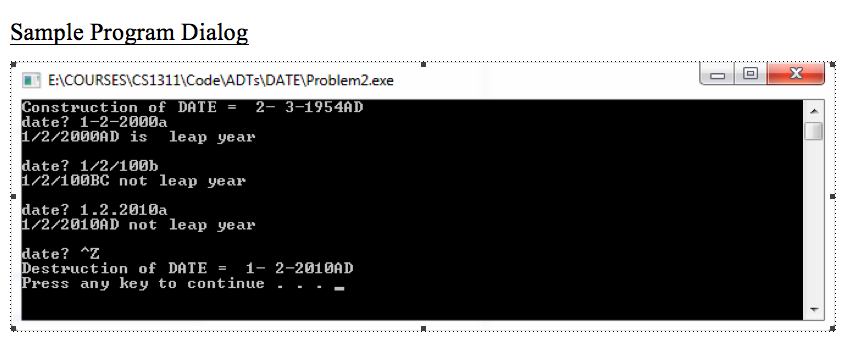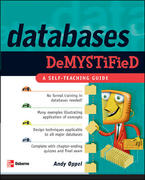Question
PLEASE SOMEONE HELP. WIll thumbs up IMMEDIATLY. C programming ONLY. Do not do in C++ plaease Take screenshot of compiled output (which should look like

PLEASE SOMEONE HELP. WIll thumbs up IMMEDIATLY.
C programming ONLY. Do not do in C++ plaease
Take screenshot of compiled output (which should look like the sample output provided)
Post all source code with your answer.
Discussion
(1) OutputDATE() (below) always uses the separator '-', always uses 2 digits for MM and DD, and always uses 4 digits for YYYY.
//--------------------------------------------------------------
void OutputDATE(const DATE *date,FILE *OUT)
//--------------------------------------------------------------
{
// Use the format MM-DD-YYYYEE where EE = "AD" or "BC"
fprintf(OUT,"%2d-%2d-%4d%2s",date->MM,date->DD,date->YYYY,
(date->epoch == 'B') ? "BC" : "AD");
}
More interesting (and potentially more useful) is a version of OutputDATE2() that (1) requires the separator character be specified as a parameter; (2) allows 1-or-2 digits, as necessary, for DD and MM; and (3) 1-to-4 digits, as necessary, for YYYY.
//--------------------------------------------------------------
void OutputDATE2(const DATE *date,char separator,FILE *OUT)
//--------------------------------------------------------------
(2) A new member function that determines whether a particular date, *date, occurs in a leap year is an interesting addition to the DATE. Lets decide (arbitrarily) that only epoch "AD" years can be leap years and, therefore, epoch "BC" years can never be leap years. Use the definition for leap year found in IntroductionToDATE.doc to determine the leapiness of date->YYYY.
//--------------------------------------------------------------
bool IsLeapYearDATE(const DATE *date)
//--------------------------------------------------------------
Problem
Add the member function InputDATE2() shown below and your versions of OutputDATE2() and IsLeapYearDATE() to the DATE source files Date.h and Date.c (shown below) then use Problem2.c (see below) as a driver program to test your extensions. (1) You will need to add the following prototypes to Date.h
// Revisions to original DATE abstract data type definitions
int InputDATE2(DATE *date,FILE *IN);
void OutputDATE2(const DATE *date,char separator,FILE *OUT);
bool IsLeapYearDATE(const DATE *date);
(2) add the new function definitions to Date.c; and (3) build a project with Date.h, Date.c, and Problem2.c and execute Problem2.exe.
//--------------------------------------------------------------
int InputDATE2(DATE *date,FILE *IN)
//--------------------------------------------------------------
{
const char DELIMITERS[] = " -/.\t ";
char line[80+2];
if ( fgets(line,80,IN) == NULL )
return( EOF );
else
{
char *pMM = strtok(line,DELIMITERS);
char *pDD = strtok(NULL,DELIMITERS);
char *pYYYY = strtok(NULL,DELIMITERS);
char *pepoch = strtok(NULL,DELIMITERS);
char epoch;
if ( pMM != NULL ) date->MM = atoi(pMM);
if ( pDD != NULL ) date->DD = atoi(pDD);
if ( pYYYY != NULL )
{
date->YYYY = atoi(pYYYY);
if ( pepoch != NULL )
epoch = pepoch[0];
else
epoch = pYYYY[strlen(pYYYY)-1];
if ( toupper(epoch) == 'A' )
date->epoch = 'A';
else if ( toupper(epoch) == 'B' )
date->epoch = 'B';
else
; // DO NOTHING!
}
return( 1 );
}
}
//-------------------------------------------------
// Dr. Art Hanna
// Date.h
//-------------------------------------------------
#ifndef DATE_H
#define DATE_H
//==============================================================
// Data model definitions
//==============================================================
typedef struct DATE
{
int MM;
int DD;
int YYYY;
char epoch;
} DATE;
//==============================================================
// Public member function prototypes
//==============================================================
void ConstructDATE(DATE *date);
void DestructDATE(DATE *date);
void InputDATE(DATE *date,FILE *IN);
void OutputDATE(const DATE *date,FILE *OUT);
void SetMMDATE(DATE *date,const int MM);
void SetDDDATE(DATE *date,const int DD);
void SetYYYYDATE(DATE *date,const int YYYY);
void SetEpochDATE(DATE *date,const char epoch);
int GetMMDATE(const DATE *date);
int GetDDDATE(const DATE *date);
int GetYYYYDATE(const DATE *date);
char GetEpochDATE(const DATE *date);
void ConvertToStringDATE(const DATE *date,char string[]);
//===============================================
// Private utility member function prototypes
//===============================================
//(none)
#endif
//-------------------------------------------------
// Dr. Art Hanna
// Date.c
//-------------------------------------------------
#include
#include
#include
#include ".\Date.h"
//--------------------------------------------------------------
void ConstructDATE(DATE *date)
//--------------------------------------------------------------
{
(*date).MM = 2; date->DD = 3;
date->YYYY = 1954; date->epoch = 'A';
// Instrumentation
printf("Construction of DATE = "); OutputDATE(date,stdout); printf(" ");
}
//--------------------------------------------------------------
void DestructDATE(DATE *date)
//--------------------------------------------------------------
{
// Instrumentation
printf("Destruction of DATE = "); OutputDATE(date,stdout); printf(" ");
}
//--------------------------------------------------------------
void InputDATE(DATE *date,FILE *IN)
//--------------------------------------------------------------
{
fscanf(IN,"%d-%d-%d%c",&date->MM,&date->DD,&date->YYYY,&date->epoch);
}
//--------------------------------------------------------------
void OutputDATE(const DATE *date,FILE *OUT)
//--------------------------------------------------------------
{
// Use the format MM-DD-YYYYEE where EE = "AD" or "BC"
fprintf(OUT,"%2d-%2d-%4d%2s",date->MM,date->DD,date->YYYY,
(date->epoch == 'B') ? "BC" : "AD");
}
//--------------------------------------------------------------
void SetMMDATE(DATE *date,const int MM)
//--------------------------------------------------------------
{
date->MM = MM;
}
//--------------------------------------------------------------
void SetDDDATE(DATE *date,const int DD)
//--------------------------------------------------------------
{
date->DD = DD;
}
//--------------------------------------------------------------
void SetYYYYDATE(DATE *date,int YYYY)
//--------------------------------------------------------------
{
date->YYYY = YYYY;
}
//--------------------------------------------------------------
void SetEpochDATE(DATE *date,const char epoch)
//--------------------------------------------------------------
{
date->epoch = epoch;
}
//--------------------------------------------------------------
int GetMMDATE(const DATE *date)
//--------------------------------------------------------------
{
return( date->MM );
}
//--------------------------------------------------------------
int GetDDDATE(const DATE *date)
//--------------------------------------------------------------
{
return( date->DD );
}
//--------------------------------------------------------------
int GetYYYYDATE(const DATE *date)
//--------------------------------------------------------------
{
return( date->YYYY );
}
//--------------------------------------------------------------
char GetEpochDATE(const DATE *date)
//--------------------------------------------------------------
{
return( date->epoch );
}
//--------------------------------------------------------------
void ConvertToStringDATE(const DATE *date,char string[])
//--------------------------------------------------------------
{
sprintf(string,"%2d-%2d-%4d%2s",date->MM,date->DD,date->YYYY,
(date->epoch == 'B') ? "BC" : "AD");
}
//-------------------------------------------------
// Dr. Art Hanna
// DATE ADT Problem #2
// Problem2.c
//-------------------------------------------------
#include
#include
#include
#include ".\Date.h"
//-------------------------------------------------
int main()
//-------------------------------------------------
{
DATE date;
ConstructDATE(&date);
printf("date? ");
while ( InputDATE2(&date,stdin) != EOF )
{
if ( IsLeapYearDATE(&date) )
OutputDATE2(&date,'/',stdout), printf(" is leap year ");
else
OutputDATE2(&date,'/',stdout), printf(" not leap year ");
printf(" date? ");
}
DestructDATE(&date);
system("PAUSE");
return( 0 );
}
Sample Program Dialog ENCOURSESCS1311CodeADTSDATEProblem2.exe onstruction of DATE2- 3-1954AD date? 1-2-2000a 1/2/2800AD is leap year date? 1/2/100b 2/100BC not leap year late? 1.2.2010a 1/2/2010AD not leap year date? *Z Destruction of DATE = 1-2-2010AD Press any key to continue - - - Sample Program Dialog ENCOURSESCS1311CodeADTSDATEProblem2.exe onstruction of DATE2- 3-1954AD date? 1-2-2000a 1/2/2800AD is leap year date? 1/2/100b 2/100BC not leap year late? 1.2.2010a 1/2/2010AD not leap year date? *Z Destruction of DATE = 1-2-2010AD Press any key to continueStep by Step Solution
There are 3 Steps involved in it
Step: 1

Get Instant Access to Expert-Tailored Solutions
See step-by-step solutions with expert insights and AI powered tools for academic success
Step: 2

Step: 3

Ace Your Homework with AI
Get the answers you need in no time with our AI-driven, step-by-step assistance
Get Started


